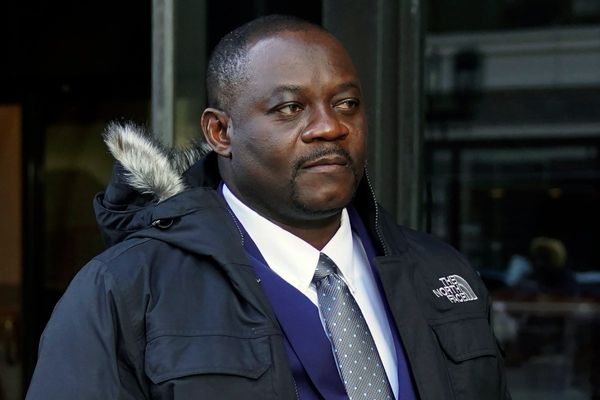A vision-impaired driver who hit and killed a cyclist in South Australia's Flinders Ranges could not see the left-hand side of the road without physically turning his head to "constantly" and "intensively" scan his surroundings, an inquest has heard.
Robert Lloyd Hall, 66, was riding his mountain bike on the side of the Horrocks Highway near Quorn on a clear day in May 2018, when a four-wheel drive struck him from behind.
The driver, John Charles Robertson, is currently serving a sentence on home detention for causing Mr Hall's death by dangerous driving.
Robertson has permanent loss of peripheral vision on his left-hand side — a condition known as "absolute left homonymous hemianopia" — caused by a stroke during brain surgery a few years before the fatal collision.
The inquest heard that Robertson was given his licence back, despite a driving instructor having to take the wheel to avoid a collision with parked cars on Mr Robertson's left during a test.
The court previously heard he was initially given a conditional licence, with conditions he not drive at night or tow a caravan.
But those conditions were later removed, despite the fact that Mr Robertson did not meet the minimum field of vision requirements for an unconditional licence.
The inquest has been hearing expert evidence from Professor Stephen Dain, of the University of New South Wales's School of Optometry and Vision Science.
Dashcam footage from Robertson's vehicle played to the court captured both the impact and the moments leading up to it.
Mr Hall could be seen riding on the extreme left-hand side of the highway in a high-vis vest, as Robertson's vehicle approached him on a left curve in the road.
Professor Dain was asked how far Robertson's field of vision would extend if he was looking at certain points on the road.
Professor Dain said Robertson's field of vision was very limited, and only extended about three to four degrees to the left of where he was focused.
"[Mr Hall] is right at the limit of what he might see without scanning," Professor Dain said.
The inquest heard Robertson had told police he initially saw the cyclist in the distance but did not see him prior to impact.
Coroner David Whittle said cyclists were in a unique position of danger and especially vulnerable to drivers with field of vision impairments.
The coroner said the only way cyclists could make themselves safe from drivers like Robertson was "to not ride on the road", and to ride on the dirt verge instead.
Professor Dain said if drivers like Robertson were not scanning properly to compensate for their vision loss, the "whole system falls apart".
The coroner said that was an apt observation, saying someone with Mr Robertson's vision impairment would have to be scanning "frequently and intensively" to keep a safe lookout on the road.
"In other words, if they are not scanning all the time for the unexpected, they are likely to just run over the unexpected cyclist," he said.
Professor Dain said being able to maintain that level of scanning would be a "very fatiguing thing to ask somebody to do".
Driving simulator could test for issues, expert says
The coroner said it was clear Robertson's visual defect was "the most severe type of any which may be suffered by a person who could ever expect to get a licence" under current provisions.
He asked Professor Dain how authorities could adequately test a person's competence and ability to scan to compensate for their field of vision loss.
Professor Dain said a driving simulator would be the best way to test for those issues.
The coroner noted that any such test could still "fall short of indicating whether the particular driver was likely to exercise his or her maximum scanning ability at all times and in all situations".
The inquest has heard Robertson was dismissive of his vision defect and self-reported to doctors that he was driving safely and competently.
When asked how important it was for people with Mr Robertson's visual impairment to accept and recognise their limitations, and compensate for them, Professor Dain said it was "absolutely vital".
"Because without that they are less likely to implement the scanning and may very much resent any restrictions on their licence," he said.
The coroner said he wanted to know how many people in South Australia currently held a licence with a field of vision defect, and how many applications for such licences are made each year.
The inquest will also hear from the transport department, before the coroner considers his findings and recommendations.







